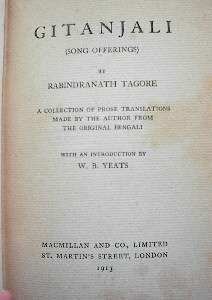Gitanjali
 Gitanjali title page | |
| Author | Rabindranath Tagore |
|---|---|
| Original title | গীতাঞ্জলি |
| Country | India |
| Language | English, Bengali |
| Subject | Devotion to God |
| Genre | Poem |
Publication date | 1910 |
Published in English | 1912 |
Gitanjali (Bengali: গীতাঞ্জলি) is a collection of poems by the Bengali poet Rabindranath Tagore. The original Bengali collection of 157 poems was published on August 14, 1910. The English Gitanjali or Song Offerings is a collection of 103 English poems of Tagore's own English translations of his Bengali poems first published in November 1912 by the India Society of London. It contained translations of 53 poems from the original Bengali Gitanjali, as well as 50 other poems which were from his drama Achalayatan and eight other books of poetry — mainly Gitimalya (17 poems), Naivedya (15 poems) and Kheya (11 poems).[1][2]
The translations were often radical, leaving out or altering large chunks of the poem and in one instance fusing two separate poems (song 95, which unifies songs 89,90 of Naivedya). The translations were undertaken prior to a visit to England in 1912, where the poems were extremely well received. In 1913, Tagore became the first non-European to win the Nobel Prize for Literature, largely for the English Gitanjali.
The English Gitanjali became very famous in the West, and was widely translated.[3] The word gitanjali is composed from "geet", song, and "anjali", offering, and thus means – "An offering of songs"; but the word for offering, anjali, has a strong devotional connotation, so the title may also be interpreted as "prayer offering of song".[3]
Poems
Some poems involve themes related to nature, but here, too, the spiritual is subtly present, as in this poem (no. 57):
Light, my light, the world-filling light, the eye-kissing light, heart-sweetening light! Ah, the light dances, my darling, at the centre of my life; the light strikes, my darling, the chords of my love; the sky opens, the wind runs
wild, laughter passes over the earth.
The butterflies spread their sails on the sea of light. Lilies and jasmines surge up on the crest of the waves of light. The light is shattered into gold on every cloud, my darling, and it scatters gems in profusion. Mirth spreads from leaf to leaf, my darling, and gladness without measure. The heaven's river has drowned its banks and the flood of joy is abroad.
See also
- Bengali literature
- Bengali poetry
- Chitto Jetha Bhayshunyo (Where the mind is without fear)
- Kazi Nazrul Islam
References
- ↑ ""Centenary of "Gitanjali""" (PDF). Frontier Weekly. Retrieved 14 August 2012.
- ↑ Ghosal, Sukriti. "The Language of Gitanjali: the Paradoxical Matrix" (PDF). The Criterion: An International Journal in English. Retrieved 14 August 2012.
- 1 2 Gitanjali: Selected Poems (2010-07-30). "Gitanjali: Selected Poems". School of Wisdom. Retrieved 2012-07-11.
External links
| Wikimedia Commons has media related to Gitanjali. |
| Wikisource has original text related to this article: |
| Bengali Wikisource has original text related to this article: |
- Gitanjali (Song Offerings)
- Gitanjali
-
 Gitanjali public domain audiobook at LibriVox
Gitanjali public domain audiobook at LibriVox
.
